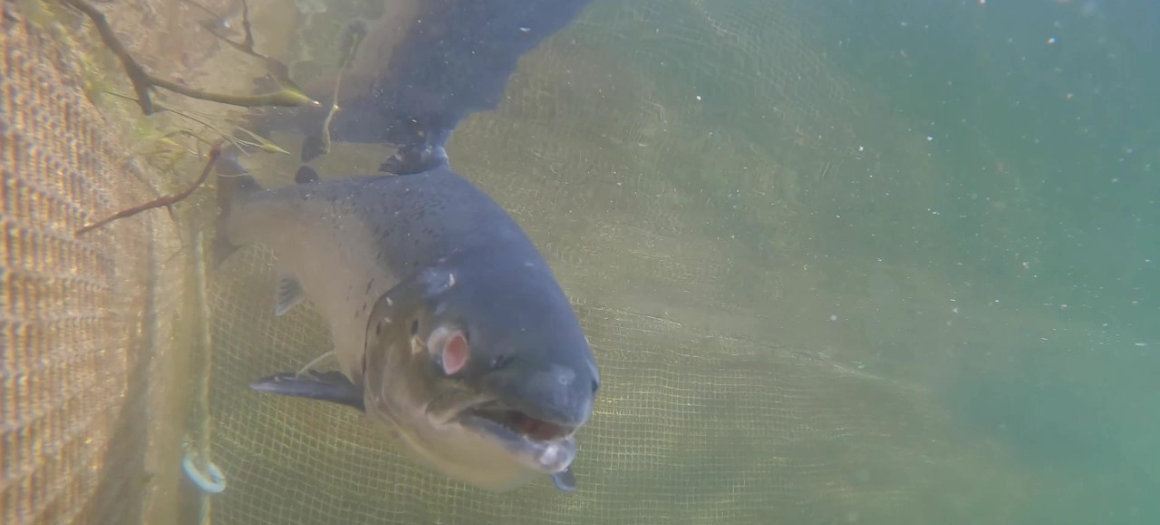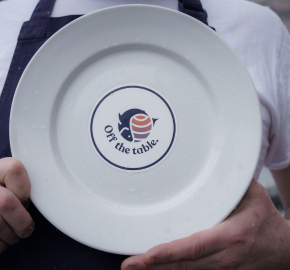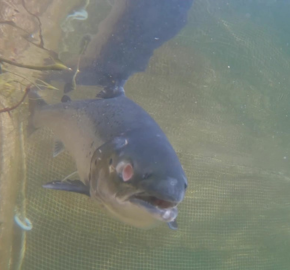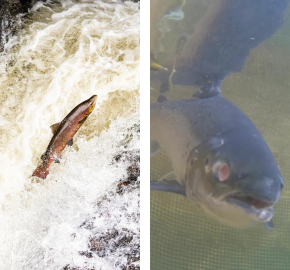Environment groups call out Soil Association’s ‘organic’ standard

More than 30 Scottish community groups, UK NGOs and international campaigning organisations have joined forces in calling on the charity Soil Association to stop certifying Scottish farmed salmon as ‘organic’.
The open letter, signed by groups including WildFish, Coastal Communities Network and Blue Marine Foundation, was sent yesterday to the CEOs of the Soil Association and Soil Association Certification in response to the organisation’s public consultation on its updated organic fish farming standard.
It highlights the negative environment, welfare and sustainability issues linked to the salmon farming industry in Scotland, and argues that these impacts are fundamentally at odds with organic farming.
So-called ‘organic’ Scottish salmon is a misnomer. The fish are raised in the same way as all Scottish farmed salmon – in open-net cages, where all the waste from the farm flows straight into the surrounding lochs and sounds, including faeces and uneaten feed.
Rachel Mulrenan
Scottish Director at WildFish
Ms Mulrenan continued: “Organic’ salmon farms are permitted to still use highly toxic chemicals, which can kill surrounding wildlife; they still use wild-caught fish to produce feed and for parasite control (typically, wrasse used as cleaner fish), with unknown environmental impacts; and they still allow for the build-up of sea lice parasites, which can spread to, and prove fatal for, wild Atlantic salmon and sea trout.”
The Soil Association’s ‘organic’ standard
The Soil Association developed its organic standard for farmed fish (including farmed salmon) in 2006. The move prompted a former chairman of the Association’s Standards Committee to state that “salmon farming in cages has nothing at all to do with organic principles”.[1]
Soil Association Certification currently certifies 23 salmon farms in Scotland – 14 seawater sites, and 9 freshwater sites. The permitted use of toxic chemicals on certified farms is of particular concern to environmental groups – including formaldehyde, a carcinogenic chemical that was used by at least two certified farms in 2023.[2]
In September 2023, WildFish published a report on certification which found that schemes such as Soil Association Organic are potentially misleading consumers on the environmental and welfare credentials of certified farmed salmon.
The report, Responsibly Sourced?, detailed the permitted use of chemical pesticides on Soil Association Organic certified salmon farms, citing one organic certified farm that had applied multiple treatments with the chemical pesticide Deltamethrin.[3]
Due to the open-net structure of seawater salmon farms, Deltamethrin is released after use into the surrounding water, damaging seabed health, and potentially killing lobsters up to 39km² around the farm.[4]
The WildFish report was released with undercover footage shot on a farm certified as ‘organic’ by the Soil Association, which showed salmon suffering from deformities and disease.[5] Since publication of the report, the Soil Association has confirmed in correspondence with WildFish that the farm remains organic certified.
Chefs and restaurants move away from open-net farmed salmon
Concerns have long been raised about the negative environmental, welfare and sustainability impacts of Scotland’s salmon farming industry, and there is a growing call across the UK and internationally for the hospitality and retail sector to move away from open-net farmed salmon on account of these issues.
More than 160 chefs and restaurants, as well as 50 community groups, charities and NGOs, are supporting WildFish’s Off the table campaign, which asks chefs and restaurants to take farmed salmon off their menus.
Claire Mercer Nairne, owner of supporting Perthshire restaurant Meikleour Arms, said: “Many well-meaning restaurants serve farmed salmon because of reassuring organic certification. Organic for most people means better for the environment, but unfortunately in this instance that could not be further from the truth. Organic or not, it’s time to take farmed salmon off the table.”
Ms Mulrenan concluded: “As stated in the open letter, if a food production system cannot balance environmental impacts with fish welfare, without using harmful chemicals, plundering marine ecosystems or using physical treatments which in turn can prove fatal for the farmed salmon themselves, this is not a sustainable food production system, and is absolutely not a food production system that should be endorsed by the Soil Association.”
List of references and notes to editors
1. http://news.bbc.co.uk/1/hi/sci/tech/5409434.stm
2. For details see Notes to Editors
3. https://wildfish.org/wp-content/uploads/2023/09/Responsibly-Farmed-Investigating-the-certification-of-Scottish-farmed-salmon.pdf. For further case studies see Notes to Editors
4. https://www.sciencedirect.com/science/article/pii/S0269749120302451
5. https://wildfish.org/latest-news/certification-of-farmed-salmon/
Case studies: chemical use on certified organic farms
NB: all farms can be found on the Soil Association certification checker: https://www.soilassociation.org/certification/check-for-organic-certification/organic-certificate-checker/ (screenshots available on request).
Formalin (formaldehye)
Landcatch Natural Selection – Inverkerry Hatchery: A health investigation carried out by the Fish Health Inspectorate in October 2023 documented the use of formalin (a formaldehyde solution) on the site following vaccination of the fish.(https://freesalmon.is/inspections/2023-0476_FS0265.pdf
Cooke Aquaculture – Cairndow Hatchery: Reported use of Aquacen (active ingredient formaldehyde) on the farm in the w/c 19th October 2023. (https://www.gov.scot/publications/fish-health-inspectorate-mortality-information/)
Deltamethrin
Organic Sea Harvest – Culnacnoc salmon farm: Treatment with Alphamax (active ingredient deltamethrin) 18/07/2023 to 21/07/2023 whole site due to caligus problems. (https://freesalmon.is/inspections/2023-0335_FS1343.pdf)
Mowi Scotland – Loch Harport: Fish health Inspectorate report 17th May 2023. Treated with Paramove (active ingredient hydrogen peroxide) on the 10th, 14th and 15th May 2023. Deltamethrin treatment 23rd and 24th April 2023 for caligus (a type of parasitic sea lice). (https://freesalmon.is/inspections/2023-0180_FS0247.pdf)




Amazed the Soil Association is not challenging the farmed salmon industry for describing their salmon AS ORGANIC. We haven’t eaten farmed salmon in years.
The Soil Association would never allow similar practices on land. It seriosly detracts from the creditability of their brand.
About 30 years ago I had a friend who was pioneering the advent of open net farmed salmon cultivation in Scotland. After a short while doing that he discovered and forecast the devastating effects that industry would have on the environment and wild fish. His conscience overcame him and he then sold his shares and left the company.
At about that time I witnessed the farms on the West Coast of Scotland. I vowed then I would not continue to fish the West Coast again (apart from the Solway Firth) until that method ceases. I had similarly regularly fished the Norwegian rivers. Then 12 years ago I was astounded to witness fish farming with open nets in the Trondheim estuary as well. I have not gone back there either since that since horrible experience.
With regard to being certified as @organic@ That is completely untrue and is a deliberate serious lie in my opinion.
The Soil Association, like the RSPCA, was a credible aid to marketing once upon a time. Having seen their support for these appalling practices, their imprimatur becomes worthless across the board. One can only assume that they do it for money.